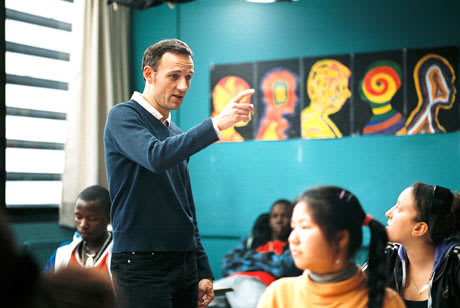A docudrama with heavy emphasis on the "docu," The Class chronicles a year in a troubled, warehouse-y junior high school in the Paris suburbs. Developed through workshops and improvisation with a group of non-professional actors playing versions of themselves - most notably writer/teacher François Bégaudeau, on whose book the movie is based - the narrative is so organic, and the performances so genuine and unmannered, that five minutes in it's impossible to remember that The Class isn't one of those fly-on-the-wall institutional exposés with which Frederick Wiseman made his name.
As all the teachers, but almost none of the (mainly immigrant) students, are white, and as our focus is mainly on Bégaudeau's French language class, we are led fairly transparently, if never heavy-handedly, to the notion of the classroom as a microcosm of modern French society, with all the associated issues of assimilation, accommodation and tolerance.
The real value-added is in the more rarely depicted backroom stuff - staff meetings, disciplinary hearings and the like. One of the most riveting scenes has a teacher breaking down in the staff lounge, no longer able to deal with "the savages"; he seems one step away from strapping on an Uzi before traumatized colleagues talk him off the ledge. Almost as fraught, in the way of academic politics everywhere, are negotiations over a new coffeemaker.
Bégaudeau is sneakily charismatic as the cool prof, the one who can, you know, "relate." But The Class is clever in illustrating how this approach can cut both ways. The last act, and the movie's one overt reach for melodrama, focuses on a tough kid from Mali who mishandles the unaccustomed freedom to the tune of a likely expulsion and removal back to Africa. There is no heart-warming ending for him, or anybody. Cases are closed and the institutional wheels roll on.
Many were surprised this past spring when the Cannes jury - led, in what is surely no coincidence, by the Hollywood-twitting, worthy cause-touting Sean Penn - made The Class the first French film in two decades to win the Palme d'Or. Apart from being overlong at 128 minutes, the film tries a bit too hard to make a virtue of its undoubted verisimilitude, spending far more time on teachable moments than engaging ones. Expect popcorn sales to spike, for example, during the hearty run-through of the imperfect subjunctive.
Few will disagree that The Class is innovative, intelligent and even artful. But for entertainment value, it gets only a passing grade.
(Mongrel Media)As all the teachers, but almost none of the (mainly immigrant) students, are white, and as our focus is mainly on Bégaudeau's French language class, we are led fairly transparently, if never heavy-handedly, to the notion of the classroom as a microcosm of modern French society, with all the associated issues of assimilation, accommodation and tolerance.
The real value-added is in the more rarely depicted backroom stuff - staff meetings, disciplinary hearings and the like. One of the most riveting scenes has a teacher breaking down in the staff lounge, no longer able to deal with "the savages"; he seems one step away from strapping on an Uzi before traumatized colleagues talk him off the ledge. Almost as fraught, in the way of academic politics everywhere, are negotiations over a new coffeemaker.
Bégaudeau is sneakily charismatic as the cool prof, the one who can, you know, "relate." But The Class is clever in illustrating how this approach can cut both ways. The last act, and the movie's one overt reach for melodrama, focuses on a tough kid from Mali who mishandles the unaccustomed freedom to the tune of a likely expulsion and removal back to Africa. There is no heart-warming ending for him, or anybody. Cases are closed and the institutional wheels roll on.
Many were surprised this past spring when the Cannes jury - led, in what is surely no coincidence, by the Hollywood-twitting, worthy cause-touting Sean Penn - made The Class the first French film in two decades to win the Palme d'Or. Apart from being overlong at 128 minutes, the film tries a bit too hard to make a virtue of its undoubted verisimilitude, spending far more time on teachable moments than engaging ones. Expect popcorn sales to spike, for example, during the hearty run-through of the imperfect subjunctive.
Few will disagree that The Class is innovative, intelligent and even artful. But for entertainment value, it gets only a passing grade.
